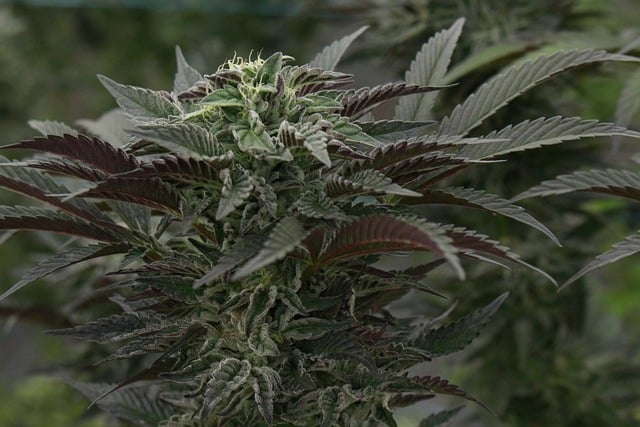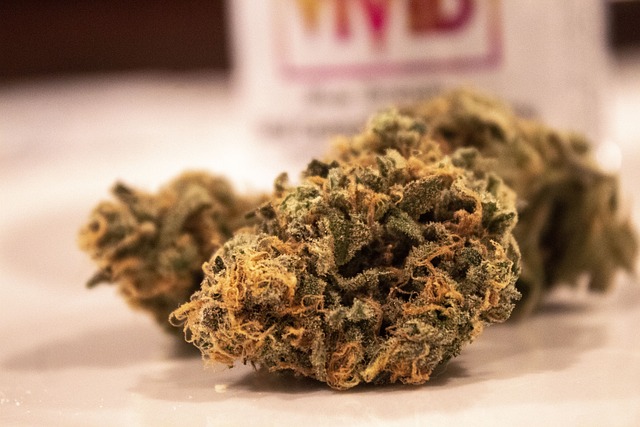Δ9-tetrahydrocannabinolic acid (THCA), a non-psychoactive cannabinoid found naturally in raw cannabis, has been recognized for its therapeutic potential, particularly as an effective natural alternative for pain management. THCA infused products, such as oils, capsules, and topicals, are gaining traction due to their ability to provide pain relief without the psychoactive effects associated with THC. These products interact with the endocannabinoid system, offering relief from various types of pain, including neuropathic and inflammatory conditions. The anti-inflammatory properties of THCA are being studied for their effectiveness in managing chronic inflammation and pain, making it a promising option for those interested in cannabis's therapeutic benefits. As research continues, THCA infused products are proving to be a valuable addition to pain management strategies, providing safe and effective relief options for consumers.
Discover the transformative potential of THCA flower, a naturally occurring compound within the cannabis plant that’s gaining attention for its remarkable analgesic properties. This comprehensive article delves into the myriad ways THCA infused products can offer effective pain relief without the psychoactive effects associated with THC. Explore the science behind THCA’s therapeutic benefits, its unique characteristics among cannabinoids, and how it interacts with our bodies to provide comfort. Whether you’re considering raw cannabis consumption or decarboxylated THCA for its analgesic effects, this guide offers insights into incorporating THCA flower safely into your wellness routine. From understanding the role of terpenes to selecting high-quality products, learn how THCA infused products can be a natural solution for chronic pain. Additionally, navigate the legal landscape and accessibility of these products, and stay informed on the latest research and product innovations in the realm of THCA flower and its applications for pain management.
- Unveiling THCA Flower: The Natural Pain Reliever
- Understanding THCA: Potential Benefits for Pain Management
- THCA Infused Products: A Comprehensive Overview
- The Science Behind THCA's Analgesic Properties
- How THCA Differs from Other Cannabinoids in Pain Relief
- Exploring the Therapeutic Effects of Raw cannabis vs. Decarboxylated THCA
Unveiling THCA Flower: The Natural Pain Reliever

Cannabis has long been recognized for its potential therapeutic properties, and among its many compounds, Tetrahydrocannabinolic Acid (THCA) stands out due to its analgesic effects. THCA is the raw, non-psychoactive precursor to THC, found abundantly in raw cannabis plants or in THC infused products for pain relief. Unveiling the benefits of THCA flower reveals a natural alternative for individuals seeking pain relief without the psychoactive effects associated with THC. Studies suggest that THCA interacts with the body’s endocannabinoid system, offering a soothing effect on various types of pain, including neuropathic and inflammatory conditions.
The interest in THCA infused products for pain relief has grown as research continues to shed light on its potential benefits. Unlike its psychoactive counterpart, THC, THCA does not induce a high but still exhibits significant analgesic properties. It is believed that THCA’s efficacy in alleviating pain stems from its ability to inhibit the breakdown of anandamide, a bliss molecule, within the body. This action may enhance mood and alleviate pain without the mind-altering effects of other cannabinoids. Furthermore, the anti-inflammatory qualities of THCA are being explored for their role in managing chronic inflammation and pain, making it a compelling option for those looking to harness the healing power of cannabis in a natural and effective way.
Understanding THCA: Potential Benefits for Pain Management

Delta-9-tetrahydrocannabinolic acid, commonly known as THCA, is a natural cannabinoid found in raw cannabis plants. Unlike its more famous counterpart, THC, THCA does not induce psychoactive effects, making it a preferred choice for those seeking relief without the high associated with traditional cannabis use. Preliminary research suggests that THCA may offer significant potential benefits for pain management. This non-psychoactive cannabinoid is believed to interact with the body’s endocannabinoid system, which plays a crucial role in regulating bodily functions and maintaining homeostasis. By binding to the CB1 and CB2 receptors, THCA may help alleviate various types of pain, including neuropathic and inflammatory discomfort.
THCA infused products have gained popularity among individuals looking for natural alternatives to over-the-counter or prescription pain relief options. These products, available in various forms such as oils, capsules, and topicals, are designed to deliver targeted relief where it’s needed most. The anti-inflammatory properties of THCA are thought to be particularly effective at reducing the swelling and tenderness associated with conditions like arthritis. Moreover, users report that THCA helps in managing chronic pain without the side effects often linked to pharmaceutical analgesics. As such, THCA infused products represent a promising addition to the toolkit for those seeking effective pain management solutions.
THCA Infused Products: A Comprehensive Overview

THCA, or Tetrahydrocannabinolic Acid, is a natural compound found in the cannabis plant that has garnered attention for its potential therapeutic benefits. Unlike its more famous counterpart, THC (Tetrahydrocannabinol), THCA is non-psychoactive, making it an attractive option for those seeking relief from pain without the psychoactive effects typically associated with cannabis consumption. THCA infused products have emerged as a versatile solution for pain management, offering a range of benefits that cater to various needs and preferences. These products are available in various forms, including topicals, capsules, tinctures, and edibles, each designed to target different types of pain and discomfort.
The efficacy of THCA infused products for pain relief stems from its interaction with the body’s endocannabinoid system, which plays a crucial role in regulating pain, inflammation, and bodily functions. Users report that THCA helps alleviate chronic pain, neuropathic discomfort, and inflammation-related conditions without the high associated with THC. Moreover, the anti-inflammatory and neuroprotective properties of THCA suggest its potential in managing a spectrum of painful conditions, from arthritis to multiple sclerosis. As research continues to unfold the myriad benefits of THCA, its role in the therapeutic landscape is becoming increasingly significant, offering a promising alternative for those seeking effective pain relief.
The Science Behind THCA's Analgesic Properties

Delta-9-tetrahydrocannabinolic acid, commonly known as THCA, is a non-psychoactive cannabinoid found in raw cannabis plants and certain THC-infused products. Scientific research has shed light on the potential analgesic properties of THCA, suggesting that it interacts with the body’s endocannabinoid system, particularly the CB1 and CB2 receptors. This interaction may help modulate pain signals, offering a natural approach to pain relief without the psychoactive effects associated with THC. Preclinical studies have demonstrated that THCA exhibits analgesic effects, which could be beneficial for individuals seeking alternatives to traditional pharmaceuticals for managing various types of pain. Furthermore, THCA-infused products, such as oils, capsules, and topicals, are increasingly being recognized for their role in pain management strategies, offering a promising addition to the realm of natural therapeutics for those experiencing acute or chronic discomfort. The ongoing research into THCA’s mechanisms of action continues to unveil its potential as an effective analgesic, warranting further investigation into its applications and optimal usage for various pain conditions.
How THCA Differs from Other Cannabinoids in Pain Relief

Cannabis contains a diverse array of compounds, among which tetrahydrocannabinolic acid (THCA) is one of the most prominent cannabinoids. Unlike its well-known counterpart THC, THCA is non-psychoactive, offering therapeutic benefits without the intoxicating effects. Research indicates that THCA possesses potent anti-inflammatory and analgesic properties, making it an attractive option for those seeking pain relief. These properties are particularly effective in addressing neuropathic and inflammatory pain, as they target the underlying mechanisms causing discomfort.
THCA infused products for pain relief are gaining traction in both medical and recreational cannabis markets. Unlike THC, which can exacerbate certain types of pain, THCA has been found to inhibit the transmission of pain signals in animal models, suggesting its potential as a natural analgesic. Its interaction with the endocannabinoid system, particularly the CB1 and CB2 receptors, is believed to modulate pain sensation without the psychoactive side effects associated with THC. This makes THCA an appealing choice for individuals who require pain relief during the day or those sensitive to the high induced by THC-dominant products.
Exploring the Therapeutic Effects of Raw cannabis vs. Decarboxylated THCA

Raw cannabis, rich in its natural form as tetrahydrocannabinolic acid (THCA), has garnered attention for its potential therapeutic effects. THCA, the precursor to THC after a process called decarboxylation, is found to exhibit anti-inflammatory and analgesic properties, making it a compelling subject of study for those seeking pain relief without the psychoactive effects associated with THC. Preclinical research suggests that THCA interacts with the body’s endocannabinoid system, influencing both neurotransmitter release and immune system responses. This interaction may offer a modulatory role in pain perception without the high typically caused by its psychoactive counterpart.
Conversely, when cannabis is heated—decarboxylated—THCA converts to THC, altering its chemical structure and effects. Decarboxylated THC has been widely recognized for its medicinal benefits, including pain relief. The psychoactive properties of THC can enhance the perceived efficacy of pain management in some individuals, due to its ability to modulate both pain and mood. Users often report a more potent analgesic effect when using decarboxylated THC compared to raw cannabis. This shift in chemical composition underscores the importance of considering the form of cannabis used when exploring its potential for pain relief. Consumers and researchers alike are examining THCA infused products, as they offer a unique opportunity to harness the benefits of cannabinoids without the intoxicating effects associated with THC. This has led to an array of THCA infused products hitting the market, providing options for those seeking targeted relief from pain.
In conclusion, the potential therapeutic benefits of THCA flower as a natural pain reliever are promising. From understanding its unique properties to exploring how it differs from other cannabinoids, it’s clear that THCA holds significant promise for those seeking alternative pain management solutions. The comprehensive overview of THCA-infused products highlights the variety of forms this cannabinoid can take, catering to diverse preferences and needs. As research continues to unravel the science behind THCA’s analgesic properties, it’s evident that this compound may play a pivotal role in the landscape of pain relief. For those interested in the benefits of raw cannabis versus its decarboxylated counterpart, the article provides valuable insights into making informed decisions about their consumption methods. Ultimately, THCA flower and THCA-infused products represent a noteworthy addition to the toolkit for managing pain, offering a natural alternative with potential health advantages.
